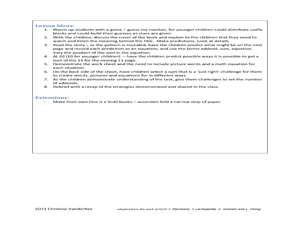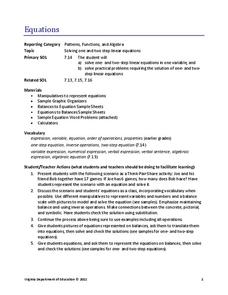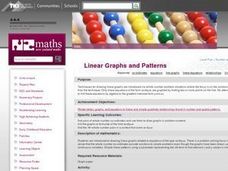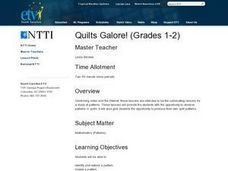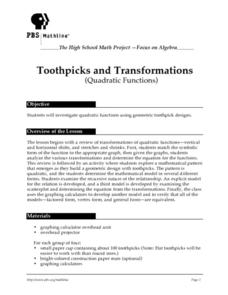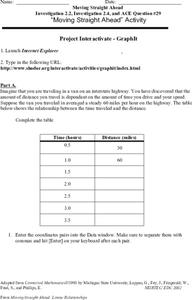Curated OER
Patterns In Hexagon Tables
Sixth graders construct a rule about the number of sides found in a pattern of hexagons. In this mathematical problem solving lesson, 6th graders observe different hexagon patterns and create a rule about the relationship between the...
Curated OER
The Kangaroo Conundrum: A Study of a Quadratic Function
Students play a game and collect data for their graph. In this algebra lesson, students solve quadratic equations and identify properties of their graph. They describe the pattern created by the graph and the game.
Curated OER
Sloping and Intersecting a Linear Function
Learners examine and discuss typical linear equations, and the difference between a linear and nonlinear equation. They observe examples of linear equations and complete a worksheet.
Curated OER
Math Quilts
Students examine geometric shapes. For this geometric shape lesson plan, students examine how geometric shapes flip, turn, and slide to create a pattern. Students analyze the role that quilts played in helping slaves escape to freedom....
Virginia Department of Education
Properties
Examine some properties that don't require a general contractor. Scholars first complete a mental math activity that uses the properties of real numbers. A separate activity formalizes these properties.
Curated OER
Book Title: One is a Snail, Ten is a Crab
Students read a story and write math problems. In this reading and math comprehension instructional activity, students preview and read the book "One is a Snail, Ten is a Crab". Students predict ways to get a sum of 11, write math...
Curated OER
Grade 3 Math-Advanced 1
In this grade 3 math worksheet, 3rd graders answer a set of 21 multiple choice "advanced" questions covering a variety of grade 3 concepts. Answers may be submitted online.
Virginia Department of Education
Equations
Science equipment can be handy for math class, too. Scholars learn to solve one- and two-step linear equations by using the concept of a balance. They solve real-world problems in a variety of contexts by writing and solving linear...
Curated OER
Linear Graphs and Patterns
Fifth graders find pairs of whole number co-ordinates and use them to draw graphs in problem contexts. They find and interpret the all meaningful pairs of whole number co-ordinates from graphs.
Curated OER
Exponential and Exponents Functions
Students solve problems using exponential properties. In this algebra lesson, students differentiate between exponents, exponential and log functions. They graph their functions using table and exponents.
Curated OER
Leap Into Exponential Functions
Students use properties of exponents to solve equations. In this algebra instructional activity, students add, subtract, multiply and divide exponential functions. They graph and differentiate between exponential growth and decay.
Curated OER
New York State Testing Program Grade 8 Math Sample Test 2005
In this New York state sample test worksheet, 8th graders solve thirty-three sample math problems designed to help students prepare for the grade eight math test. Tips for taking the test are provided.
Curated OER
Quilts Galore
Students explore patterns. They observe a video, "Math Monsters." Students determine the next item in a sequence. Students read books about patterns. They discuss patterns in quilts. Students visit a specified web site and design...
Curated OER
Where Should They Hold the Fundraising Party?
Pupils explore financial applications of linear functions. As they investigate the steps necessary to plan a fundraising event, learners explore minimizing cost and maximizing profits.
PBS
Toothpicks and Transformations
Students investigate quadratic functions using geometric toothpick designs. They review transformations of quadratic functions-vertical and horizontal shifts, and stretches and shrinks. Students match the symbolic form of the function to...
Curated OER
Stressed to the Breaking Point
High schoolers explore the relationship between the amount of weight that can be supported by a spaghetti bridge, the thickness of the bridge, and the length of the bridge to determine the algebraic equation that best represents that...
Curated OER
Why is this lesson constructivist?
Students formulate a definition of tessellations by comparing and contrasting different patterns and shapes of real objects. They discuss the relatioship between shapes and patterns as well as their function in the real world. Students...
Curated OER
Sequences
Young scholars solve problems using the TI. In this calculus instructional activity, students evaluate functions using sequences. They graph the functions on the TI and make observations.
Curated OER
Exploration Sequence of Bounces
New skills are developed as students use graphing calculators and ranger technology to capture and graph the sequence of bounces a ball makes when dropped. After recording the height of four or more bounces, they use the collected data...
Curated OER
The Yo-Yo Problem: Solving Linear Equations
Young scholars compute the length of time it will take to save enough money to purchase a yo-yo. In this math instructional activity, students create a design with pennies and write the associated linear equation. In this linear...
Curated OER
Moving Straight Ahead
In this functions worksheet, 9th graders solve and complete 24 various types of problems. First, they complete the table with the correct distance for each hour given. Then, students enter the coordinate pairs into the function table...
Curated OER
Patterns
Fifth graders explore patterns. In groups, 5th graders participate in a "Pasta Pattern" activity. Given a bag of pasta, classmates sort pasta by shapes. They use pasta pieces to model different patterns. Students complete a bean...
Curated OER
Patterns and Sequence
Sixth graders explore patterns and sequencing. As a class, they name numbers that fit in a pattern. Students use pattern blocks to construct and identify patterns. They use a calculator to create input and output functions.
Curated OER
Using Patterns
In this math worksheet, 6th graders use the time at home in order to work on the skill of recording data in the form of daily activities and statistics.







